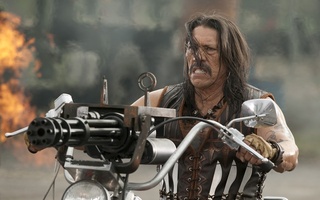
Danny Trejo stars in "Machete," a feature-length adaptation of a mock-trailer preceding 2007's "Grindhouse."
A horde of barbarians are crucifying a priest on his church’s cross in a blasphemous expression of inchoate, murderous rage as “Machete” co-writers and directors Robert Rodriguez and Ethan Maniquiz depict present day life in Austin, Texas with a brutal fury more appropriate for ancient Rome. A feature-length adaptation of a mock-trailer preceding “Grindhouse,” Rodriguez’s 2007 collaboration with Quentin Tarantino, “Machete” is undeniably aggressive, exploitative, and gratuitous. But at the same time, it’s brilliant.
Focusing on the problems of illegal immigration and the growing influence of Mexican drug cartels, every element of the movie is exaggerated: the evil is pure, condensed, and particularly despicable, while the forces of good are fearless, charismatic, and attractive. Rodriguez and Maniquiz mock the Texan mystique, caricaturing cowboys as violently intolerant hypocrites. But since the film is so clearly ridiculous (the main character’s preferred weapon is, of course, a machete), one must forgive the lack of nuanced character development. Instead, the film is designed as a vehicle of pure amusement, with a decadent display of gratuitous bloodshed and complete dereliction of moral rectitude.
Danny Trejo’s titular character carries himself throughout the movie with the calm of absolute physical power. The film doesn’t do him any aesthetic favors. Throughout the majority of the film, his face is covered in white tape to cover his oozing wounds, his skin is pockmarked, his hair is lank, and his gait is staggering. Despite all this, he’s the charismatic core of the film. Against him, everyone else seems nervous and frenetic as he slashes his way from one scene to the next with single-minded, lethal aplomb.
One gets the sense that Machete doesn’t read much (he doesn’t even like to text), but he’s definitely smart. For example, as he lies in a hospital bed, he learns from a doctor that human intestines are about sixty feet long. He has absorbed and found a way to employ that information within ten minutes. In an example of innovation at its finest, he uses a still-breathing, would-be assassin’s intestines as a rope with which to flee from the hospital window. Such dynamism serves Machete, and the film, well.
Trejo is surrounded by actors who play well off him, notably Michelle Rodriguez, who has finally found an environment in which her perpetual scowl is both appropriate and laudable, and Jessica Alba, who somehow manages to look sweet even as she stabs out a man’s eye with her stilettos.
The unfortunate Lindsay Lohan also finds herself in the movie, though she does little other than spend time looking world-weary and being naked. Maniquiz and Rodriguez are masters of camp, handling their material so deftly as to inspire ironic laughter with the film, instead of at the film. Lohan has become such a camp figure herself, having lost whatever shred of autonomy and dignity she ever had to tabloids long ago, that she threatens the fine balance of the scenes she is in. Despite her talents as an actress, it’s hard to separate her perceived public identity from her character in the film, especially when that character decides to frequent crack dens and engage in threesomes with her mother.
“Machete” also loses a bit of its forward momentum at its climax, a battle scene between the ranged forces of good and evil, as represented by the so-called “Network” of illegal immigrants and hostile Texans, respectively. By this point, it’s clear that Machete will have to win. Any other alternative would strongly clash with the film’s joyfully simplistic sense of right and wrong. So the film loses its sense of earlier dynamic urgency when the audience isn’t sure whether Machete will be able to decapitate his way out of every situation. By the film’s conclusion, it’s clear that he surely will. Nevertheless, “Machete” maintains an incredible level of energy as it careens towards its somewhat predictable conclusion.
“Machete” is rich in humorous detail and provides a satisfying narrative arc. For those reasons alone, it rises far above its current cinematic competition. And even when the violence reaches such hyperbolic extremes that one has to laugh, in spite of one’s self, it is important to remember that there is a remarkably well-made film hidden beneath the entrails.
—Staff writer Catherine A. Morris can be reached at morris6@fas.harvard.edu.
Read more in Arts
Nolan’s ‘Inception’ Is A Dream Worth HavingRecommended Articles
-
Harvard Students Remain Largely Unaware of a String of Violent Crimes in BostonA series of violent crimes in Boston this weekend left two dead—including a pregnant teenager—and seven injured, with four wounded
-
A Man With a Machete is On the LooseThe Cambridge police are looking for a man with a machete.
-
Machete Attacker Eludes PoliceThe machete-wielding attacker who struck a man on Jan. 21 in “The Pit” remains at large, according to the Cambridge Police Department.
-
 "Machete Kills" A Bloody Mess
"Machete Kills" A Bloody Mess -
 For Longtime HUDS Staffer, Multimillion-Dollar Windfall Brings Relief
For Longtime HUDS Staffer, Multimillion-Dollar Windfall Brings Relief













